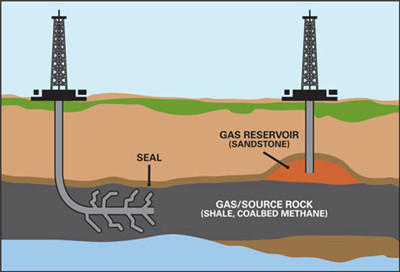(单词翻译:单击)
Fracking, which is blamed by some for causing earthquakes in the US, could unlock nearly 140bn barrels of global oil supplies — equivalent to Russia’s known reserves, says a study.
一项研究表明,被一些人指责在美国诱发地震的水力压裂法(fracking,又称Hydraulic fracturing)或将使全球石油供应量增加近1400亿桶,相当于俄罗斯已知石油储量。
Countries such as Iran, Russia, Mexico and China stand to gain most from exploiting techniques used by modern-day wildcatters in America’s shale revolution to breathe life into their ageing oil and gasfields, according to analysis by IHS, the research company.
调研公司IHS的分析认为,伊朗、俄罗斯、墨西哥和中国等国家将是这项技术的最大受益者,利用美国页岩革命中当代钻探公司采用的这项技术,这些国家将能使它们老化的油气田恢复生机。

Two-thirds of the extra recoverable oil would come from the Middle East and Latin America, it has estimated.
该研究预测,额外可开采石油中的三分之二将来自中东和拉美地区。
Hydraulic fracturing, or fracking, involves pumping a mixture of water, sand and chemicals at high pressure into rocks deep underground to open up tiny fissures, allowing oil and gas to flow more freely to the wellhead. Horizontal drilling — sinking a well a mile or more straight down, then a mile or more sideways — has made it possible to expose a greater area of resource-bearing rock.
水力压裂法的原理是通过高压将掺入沙和化学物质的水注入地底深处的岩层,打开细小的裂缝,使石油和天然气能够更自由地流到钻井口。水平钻井技术(Horizontal drilling)——先垂直向下钻井1英里或更深,然后向水平方向钻探1英里或更远——能使更多蕴含资源的岩层区域得到开采。
These processes have contributed to a boom in US output, with companies using technological advances to cut costs and improve productivity. But it is less widely used elsewhere, in part due to environmental opposition but also the need for specialist equipment.
这些方法促进了美国油气产量的大幅增长。利用技术进步,企业削减了成本,提高了生产率。但水力压裂技术在其他地方并未得到广泛使用,部分原因是遭到环保人士反对,同时也是因为使用这项技术需要专门的设备。
In the UK, more densely populated than the US, drillers hoping to frack shale gas reserves have met public wariness amid concern over the risk of minor earth tremors — which can be triggered by injecting waste water back underground — and the noise and disruption from transporting materials to and from sites.
在人口比美国稠密的英国,希望使用水力压裂法开采页岩气的钻探公司引起了公众的警惕。人们担心这项技术有诱发轻微地震的风险(重新将废水注入地下的做法可能引发这一现象),此外从开采地点来往运输材料会造成噪音和干扰。
IHS says as much as 141bn barrels could be unlocked from known fields outside North America, with 135bn of these in plays likely to require fracking. As much as 40bn of these barrels lie in Iran, where the government is hoping to attract foreign investment if and when sanctions are lifted following a deal on its nuclear ambitions. Mexico, which is opening its energy sector to foreign investment, follows with 14bn of potentially recoverable barrels, Russia with 12bn and China 6bn.
IHS称,北美洲以外的已知油田还可以开采多达1410亿桶原油,其中1350亿桶可能需要用水力压裂法开采。其中伊朗可以额外开采400亿桶石油,该国政府目前希望,在其与国际社会达成核协议后,一旦制裁解除,将能吸引来外国投资。正向外资开放能源行业的墨西哥排在其后,已知油田拥有140亿桶潜在的可采石油,俄罗斯拥有120亿桶,中国拥有60亿桶。
IHS has examined more than 170 mature oil plays worldwide and three fields in France, Tunisia and China where operators have revived old assets with new technologies. In France, where fracking is not allowed, the Saint Martin de Bossenay field near Paris, abandoned in 1996, has been redeveloped with horizontal drilling, boosting its rate of oil recovery from 40 to 44 per cent and swelling its reserves by 1m barrels, or about 10 per cent.
IHS对世界各地逾170家成熟石油企业以及法国、突尼斯和中国三个利用新技术进行重新开采的旧油田进行了调查。法国禁止使用水力压裂法,于1996年被废弃的巴黎郊区Saint Martin de Bossenay油田已经采用水平钻探技术重新开采,采油速度从40%上升至44%,石油储量增加了100万桶,相当于扩大了约10%。
According to IHS, the fields that could benefit from the new technologies are relatively evenly distributed across the world. The other top 10 countries, each with more than 4bn in additional resources, are the United Arab Emirates, Kuwait, Kazakhstan, Algeria, Libya and Venezuela.
据IHS调查,可受益于新技术的油田相对均匀地分布在世界各地。除了伊朗、俄罗斯、墨西哥和中国,排在前十的其他国家为阿联酋、科威特、哈萨克斯坦、阿尔及利亚、利比亚以及委内瑞拉,每个国家额外可开采的石油资源都在40亿桶以上。


